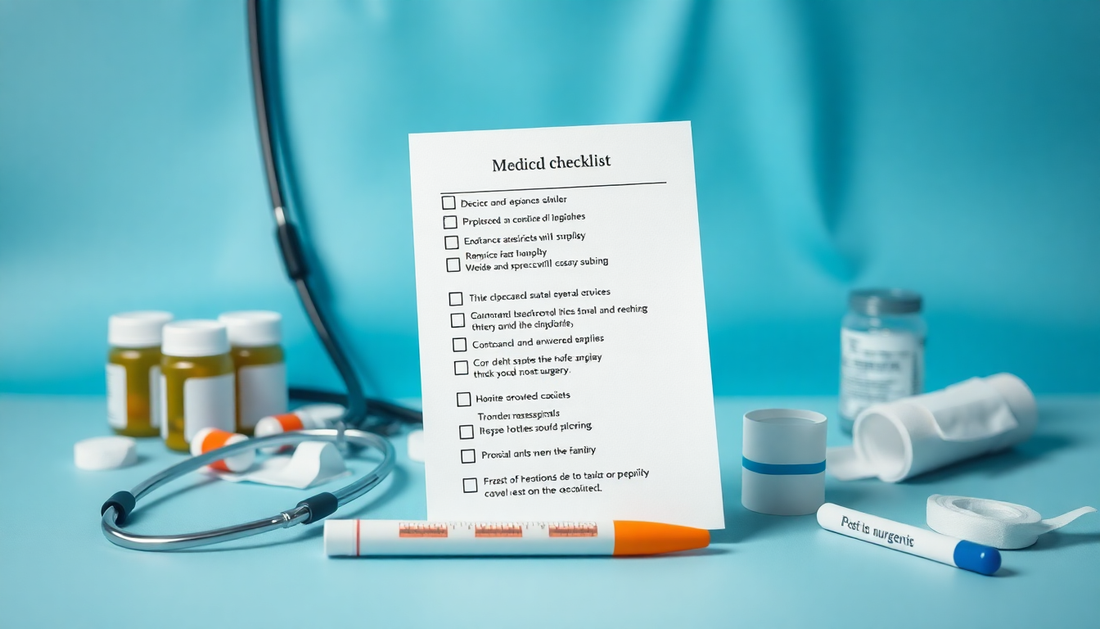
Top 10 Mistakes to Avoid During Post-Surgery Recovery
Share
Recovering from surgery is a delicate process that demands careful attention and adherence to guidelines for optimal healing. Unfortunately, many patients inadvertently make mistakes that can hinder their progress. This guide explores the top 10 mistakes to avoid during post-surgery recovery, helping you achieve a smooth and successful journey toward full health.
Mistake 1: Ignoring Doctor’s Orders
Failing to follow your healthcare provider’s instructions can significantly compromise recovery. Every guideline, from medications to activity restrictions, is designed to support healing.
Key Areas to Focus On:
- Medication Management: Take prescribed medications as directed to manage pain and prevent infections. Skipping doses or altering dosages can delay healing and increase complications (PubMed).
- Activity Limitations: Avoid strenuous activities or movements that could reopen incisions or cause injuries.
Mistake 2: Rushing the Recovery Process
Attempting to return to normal activities too quickly can lead to setbacks. Healing takes time, and overexertion can increase pain, swelling, and the risk of complications.
Why Patience Matters:
- Overexertion Risks: Strenuous activities can strain surgical sites, leading to prolonged recovery times (BMJ).
- Gradual Progression: Follow a step-by-step plan from your healthcare team for safe reintegration into daily activities.
Mistake 3: Poor Wound Care
Proper wound care is critical to prevent infections and ensure smooth healing. Neglecting wound hygiene can lead to complications.
Tips for Effective Wound Care:
- Clean Properly: Follow your provider’s instructions for cleaning and dressing the surgical site. Avoid harsh solutions that may damage tissues.
- Monitor for Infection: Watch for redness, swelling, pain, or discharge, and report these signs promptly (NIH).
Mistake 4: Neglecting Nutrition
A nutrient-rich diet is essential for tissue repair, immune support, and energy replenishment during recovery.
Nutritional Priorities:
- Protein: Supports tissue regeneration and wound healing.
- Key Nutrients: Incorporate vitamin C, zinc, and omega-3 fatty acids to boost recovery (Harvard Health).
Mistake 5: Inadequate Rest and Sleep
Rest is a cornerstone of recovery. Poor sleep or insufficient rest can hinder the body’s healing mechanisms.
Sleep Essentials:
- Healing Role of Sleep: Sleep facilitates tissue repair and immune regulation.
- Create a Restful Environment: Limit distractions, reduce screen time before bed, and practice relaxation techniques (Cleveland Clinic).
Mistake 6: Skipping Follow-Up Appointments
Post-operative check-ups are critical for tracking progress and addressing potential issues.
Why Follow-Ups Matter:
- Monitor Healing: Regular visits allow healthcare providers to assess your recovery.
- Address Complications Early: Timely intervention can prevent minor issues from escalating (Mayo Clinic).
Mistake 7: Improper Pain Management
Effective pain management is vital for comfort and recovery. Ignoring or mishandling pain can prolong healing and affect mobility.
Balanced Pain Relief:
- Avoid Over or Under-Medicating: Work with your provider to find the right balance of medications and alternative therapies.
- Additional Techniques: Ice packs, heat therapy, and gentle exercises can complement medications.
Mistake 8: Neglecting Mental Health
Surgery can take a toll on mental health, making it important to address emotional well-being.
Steps to Support Mental Health:
- Acknowledge Emotional Impact: Stress, anxiety, or depression can hinder recovery.
- Seek Support: Connect with mental health professionals or support groups for guidance (JAMA).
Mistake 9: Ignoring Physical Therapy
Physical therapy helps restore mobility, strength, and flexibility. Skipping therapy can delay recovery and limit long-term functionality.
Physical Therapy Benefits:
- Improved Healing: Rehabilitation exercises aid in regaining strength and reducing stiffness.
- Avoid Long-Term Complications: Adherence prevents issues like reduced range of motion or chronic pain (NEJM).
Mistake 10: Unhealthy Habits
Smoking, excessive alcohol consumption, or a sedentary lifestyle can impair recovery by slowing wound healing and weakening the immune system.
Healthy Lifestyle Changes:
- Quit Smoking: Smoking reduces oxygen delivery to tissues, impairing healing.
- Moderate Alcohol Intake: Alcohol interferes with immune response and tissue repair (CDC).
Conclusion
Post-surgery recovery requires a mindful approach to avoid common pitfalls. By adhering to your healthcare provider’s instructions, prioritizing rest and nutrition, and addressing both physical and mental health, you can navigate the recovery process with confidence and achieve optimal outcomes.
Medical Disclaimer
This blog is for informational purposes only and does not constitute medical advice. Always consult your healthcare provider for personalized guidance and recommendations.
